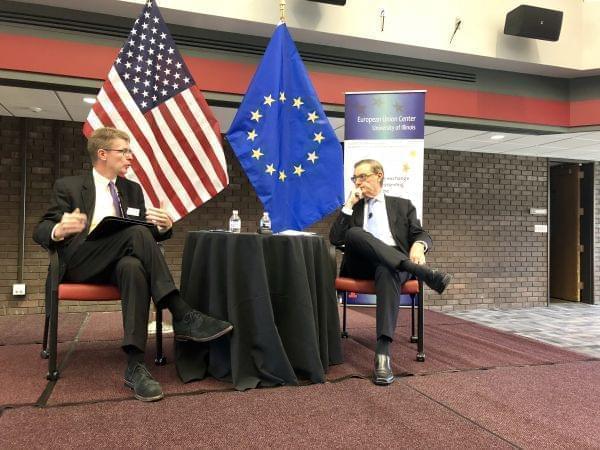E.U. Ambassador Discusses Iran Sanctions, Dangers Of Nationalism

William Bernhard (left), Vice Provost for Academic Affairs, moderates a discussion with E.U. Ambassador to the U.S. David O'Sullivan (right) at the U of I campus. Anna Casey/Illinois Public Media
European Union ambassador to the U.S. David O’Sullivan was on the University of Illinois campus in Urbana for a public talk Friday. The visit was part of the 17th annual European Union Day organized by the university’s European Union Center.
During a discussion at the Levis Faculty Center, O’Sullivan was asked his thoughts on U.S. and European relations, which he said are going through a particularly difficult moment.
“We’ve had difficult moments, and I think there always will be moments of tension,” O’Sullivan said. “I think we’re going through a particular moment of tension these days.”
O’Sullivan cited President Trump’s recent decision to re-impose economic sanctions on Iran as one source of tension. Iran had agreed to abide by certain restrictions on the development of its nuclear program in exchange for eased sanctions under the Iran Nuclear Deal negotiated during the Obama administration. Much to the disappointment of many European allies, President Trump decided to remove the U.S. from the accord and re-impose sanctions.
“This is the first time, to be very frank, that we’ve been in a situation where the United States is unilaterally seeking to change the European foreign policy through the imposition of sanctions,” O’Sullivan said. “And frankly I think this is a much more dangerous moment than many people realize.”
During the informal European Union Day discussion, O’Sullivan was also asked about increasing populist sentiment emerging among people around the world who are rejecting globalism and international institutions such as the United Nations. O’ Sullivan took that as an opportunity to discuss what he views as a misconception about the role of the European Union.
“This is not about the denial of national identity or the disintegration of the nation-state… our member states are fiercely proud of their language, their history, their traditions,” O’ Sullivan said. But he added the continent has learned its lesson from two world wars and needs a different business model from the one that led to them.
O'Sullivan also stressed during his visit the important diplomatic and economic relationship between the European Union and the U.S., noting that the E.U. is the top export destination for 45 out of 50 states. "Relations between the U.S, and E.U. are complex," O'Sullivan said. "But it's one of the most important relationships."

